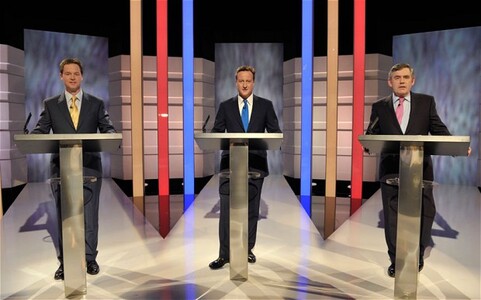100 signatures reached
To: ITV, BBC, Chanel 4, Sky News
Include Green party and SNP as well as UKIP in televised debates

Please include the Green party leader, Natalie Bennet, and the SNP leader as well as the UKIP leader, Nigel Farage, in order to more accurately represent tradionally outlying parties which are becoming much more important in the current political environment.
Why is this important?
As opinion polls and recent election results predict that the general election next year will be close run, with no party winning an outright majority being a likely outcome. In this environment smaller parties, who themselves are seeing a large right in voter interest and memberships, are likely to perform vital roles in the formation of coalitions next year. These parties address the overall trend of voter apathy as well as a challenge to the traditional 2 (or 3) party system. As such the television debates offer a vital opportunity to get more voters involved in and aware of changes in the political system and increase declining voter turnout. It's possible to see from the below link that TV debates can help this considerably.
http://www.ukpolitical.info/Turnout45.htm
The Green party is an established party (founded 1990) which has one MP, one Lord, three MEPs and holds 160 local council positions. Membership for the party is over 20,000 with a rise of 45% in membership this year. This rise has been particularly big amongst the youth demographic which has seen a 100% rise in the last year. As this is a key demographic that has low voter turnout and highest levels of voter apathy, it is the responsibility of media outlets to help this demographic engage with politics.
http://www.theguardian.com/commentisfree/2014/may/20/green-party-support-media-ukip
http://greenparty.org.uk/news/2014/10/03/green-surge-membership-of-the-green-party-up-45-in-2014-alone/
The SNP is also an established party in Scotland (since 1934) which has 6 MPs, 2 MEPs, 421 local government positions (as well as their members in the Scottish Parliament) and 80,000 members. They have been called the 3rd biggest political party in the UK. Their membership too has since a large rise in membership over the last few years, partly due to the referendum, but has seen membership double since the referendum. They too are particularly popular amongst the apathetic youth voters and their credentials in increasing voter turnout is very much proven in the context of referendum.
http://www.scotsman.com/news/politics/top-stories/snp-members-double-since-independence-referendum-1-3549827
http://www.theguardian.com/commentisfree/2014/sep/21/scottish-referendum-massive-voter-turnout-means-politics-changed-for-ever
UKIP is too an established party (since 1993) with 1 MP, 24 MEPS, 370 members of local government and 48,623 members. They have seen a 3800 member rise in 2014. UKIP has been extensively covered by mainstream media in 2014 due to the European Parliament elections and recent defections from the Conservative party. UKIP have been representing themselves as a party that wants to decrease voter apathy and have had positive results at shaping the political debate in recent months.
http://www.ukip.org/ukip_membership_crashes_through_35_000
http://theday.co.uk/politics/wind-of-change-blows-through-uk-politics
http://www.ukpolitical.info/Turnout45.htm
The Green party is an established party (founded 1990) which has one MP, one Lord, three MEPs and holds 160 local council positions. Membership for the party is over 20,000 with a rise of 45% in membership this year. This rise has been particularly big amongst the youth demographic which has seen a 100% rise in the last year. As this is a key demographic that has low voter turnout and highest levels of voter apathy, it is the responsibility of media outlets to help this demographic engage with politics.
http://www.theguardian.com/commentisfree/2014/may/20/green-party-support-media-ukip
http://greenparty.org.uk/news/2014/10/03/green-surge-membership-of-the-green-party-up-45-in-2014-alone/
The SNP is also an established party in Scotland (since 1934) which has 6 MPs, 2 MEPs, 421 local government positions (as well as their members in the Scottish Parliament) and 80,000 members. They have been called the 3rd biggest political party in the UK. Their membership too has since a large rise in membership over the last few years, partly due to the referendum, but has seen membership double since the referendum. They too are particularly popular amongst the apathetic youth voters and their credentials in increasing voter turnout is very much proven in the context of referendum.
http://www.scotsman.com/news/politics/top-stories/snp-members-double-since-independence-referendum-1-3549827
http://www.theguardian.com/commentisfree/2014/sep/21/scottish-referendum-massive-voter-turnout-means-politics-changed-for-ever
UKIP is too an established party (since 1993) with 1 MP, 24 MEPS, 370 members of local government and 48,623 members. They have seen a 3800 member rise in 2014. UKIP has been extensively covered by mainstream media in 2014 due to the European Parliament elections and recent defections from the Conservative party. UKIP have been representing themselves as a party that wants to decrease voter apathy and have had positive results at shaping the political debate in recent months.
http://www.ukip.org/ukip_membership_crashes_through_35_000
http://theday.co.uk/politics/wind-of-change-blows-through-uk-politics
